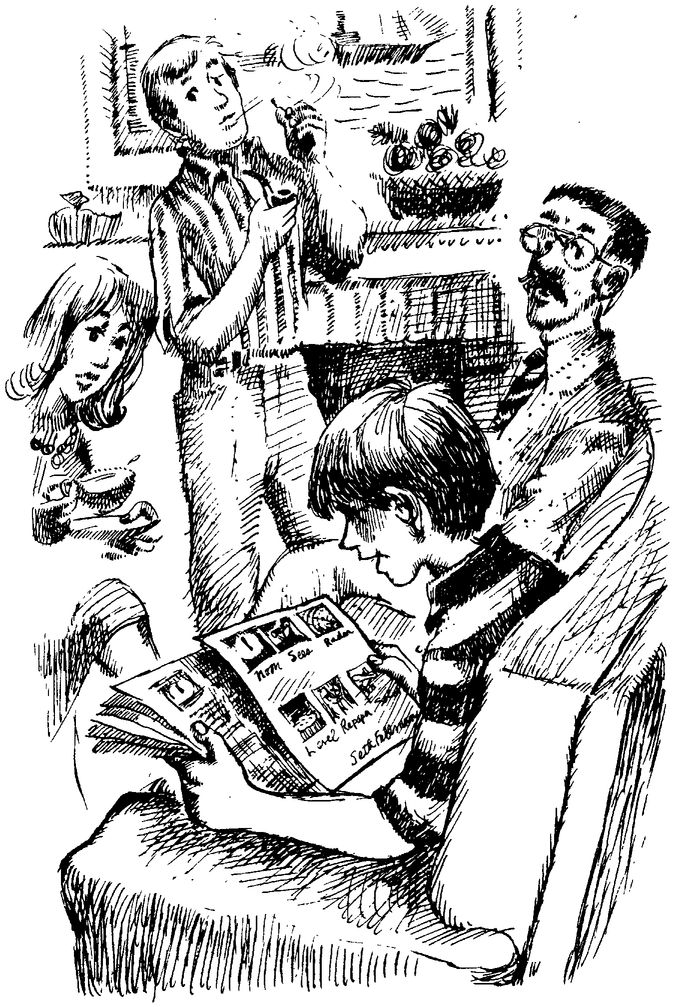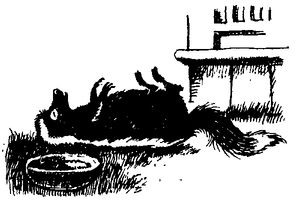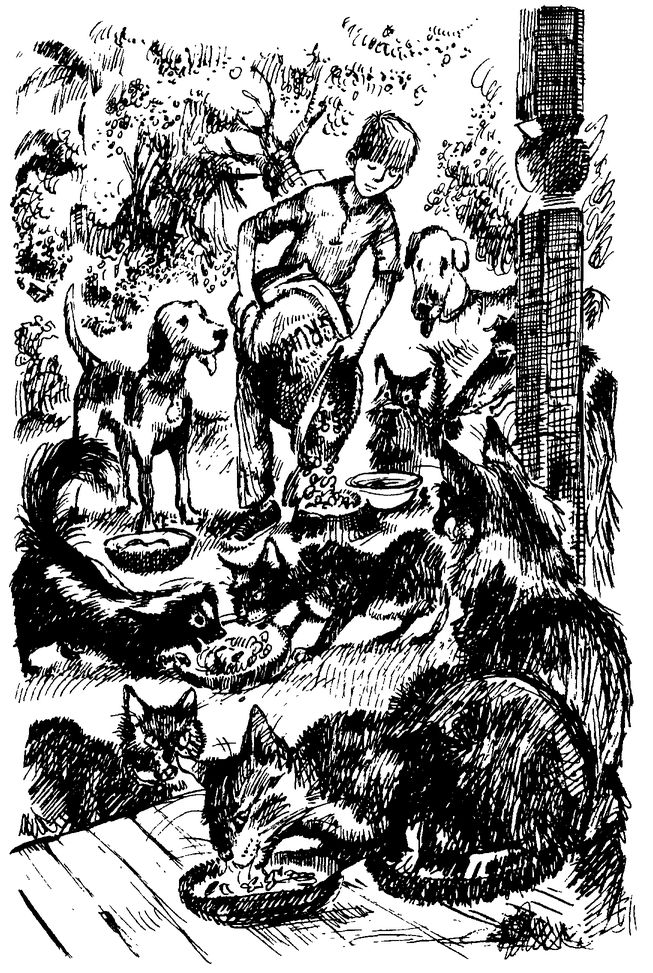Encyclopedia Brown Takes the Case (5 page)
Read Encyclopedia Brown Takes the Case Online
Authors: Donald J. Sobol

“What do you make of that?” gasped Sally.
“I’m afraid somebody fed him knockout drops to keep him from winning,” replied Encyclopedia.
“How?” said Sally. “So many people are watching.”
“Is there anyplace around here where someone can hide for a few minutes?” asked Encyclopedia.
“Over there,” said Fangs. He pointed to a large shed, which had been built when the rock pit was being worked. “There’s a hose outlet on the other side of the shed. Puddinghead used it to fill his water can.”
“Did Horace Cushing, the starter, ever go in there?” asked Sally.
“A couple of times,” replied Fangs. “I’m pretty sure he was stealing a smoke.”
Fangs paused thoughtfully.
“You know the dog that won the final?” he said. “He’s owned by Horace. But come to think of it, the dog that finished second belongs to Puddinghead!”
“Either boy could have doped Rags to give his own dog a better chance,” said Sally.
“You’ll have to excuse me,” said Fangs. “I’m supposed to award the hamburger meat to the winner.”
Before he could walk away, Puddinghead came over.
“Here,” he said, handing Fangs a shiny one-gallon gasoline can. “Thanks a lot.”
“You used a
gasoline
can to fill the water bowls?” howled Sally.
gasoline
can to fill the water bowls?” howled Sally.
“It’s brand new,” Fangs assured her. “My dad bought it this morning.”
“Tell me something,” said Encyclopedia. “When you filled the gasoline can with water before the final race, did you see anyone at the work shed?”
“Just Horace Cushing,” answered Puddinghead. “He was grinding out a cigarette.”
“Was he still there when you went back?” asked Encyclopedia.
, “I wouldn’t know,” said Puddinghead. “I only made one trip for water. After I filled the bowls, I waited around for the race to begin.”
After Puddinghead had left, Sally shook her head.
“Puddinghead couldn’t have filled the gasoline can with water at the shed, put in the knockout drops, and filled all the bowls. Every dog in the race would have been knocked out. He has to be innocent.”
“You mean he’d be innocent if this were Canada,” replied Encyclopedia. “But this is Idaville, U.S.A.”
WHAT DID ENCYCLOPEDIA MEAN?
(Turn to page 93 for the solution to The Case of the Dog-Paddle Derby.)

The Case of the Broken Globe
The Browns were sitting in the living room after dinner when Mr. Morton stopped by.
Mr. Morton taught at the high school. He and Chief Brown had been friends since boyhood.
“I hate to bother you at this hour,” apologized Mr. Morton. “But ... well, something serious happened in my class today.”
He put down his briefcase and took a seat.
“I need your help... er ... as a friend,” he said.
“I understand,” said Chief Brown. “You want to keep the trouble quiet.”
“Yes,” replied Mr. Morton. “My students aren’t criminals. And to tell the truth, no law was broken.”
“I promise not to make any arrests, if that is what is worrying you,” said Chief Brown with a grin. “Now, what is this all about?”
“I gave my journalism class a test today,” said Mr. Morton. “I left the room for five minutes. While I was gone, a globe of the world, worth ninety dollars, was smashed.”
“And you want me to find out who broke it?” asked Chief Brown.
“I do,” said Mr. Morton. “I doubt if it was knocked over on purpose. More likely, it was an accident. However, no one in the class will tell me who broke it.”
“Everyone is afraid of being a squealer, eh?” said Chief Brown in annoyance. “Protect the guilty! I bump into that kind of foolishness every week.”
“What was the test you gave the journalism class?” asked Mrs. Brown.
“It was on caption writing,” answered Mr. Morton. “Each student was given six pictures and told to write a caption—a description—for each.”
Mr. Morton opened his briefcase. He pulled out the test papers and showed them to Chief Brown.
Chief Brown looked at them quickly and handed them to Mrs. Brown. She gave each a glance and passed them to Encyclopedia.
While the grown-ups talked about the case, the boy detective gave the tests his full attention. Each student had been given the same pictures to work with. The difference in what each wrote was remarkable.
One of the test papers, turned in by a boy named Gene Dickman, caught Encyclopedia’s eye. Whereas the other students had written captions of twenty to fifty words, Gene had written only one word under each picture.
Under a picture of a clock with both hands pointing to 12, he had written “NOON.”

While the grown-ups talked about the case, the boy
detective gave the tests his full attention.
detective gave the tests his full attention.
Under a picture of an old sea captain scanning the horizon with a spyglass, he had written “SEES.”
Under a picture of a screen with white dots, he had written “RADAR.”
Under a picture of a calm and unrippled lake, he had written “LEVEL.”
Under a picture of a paperhanger working on a wall, he had written “REPAPER.”
Under a picture of a small airplane, he had written “SOLOS.”
“I wonder ...” Encyclopedia muttered.
Hurriedly he checked the names at the top of the other test papers: Robert Mason, Mary Keith, Anna McGill, George Worth, Mike Duval, Phil Johnson, Connie Logan, Scott Muncie, and Dwight Sherman.
Encyclopedia closed his eyes. He always closed his eyes when he did his heaviest thinking.
Then he asked a question. One question was all he needed to ask in order to solve a case.
“Are these all the students in your class, Mr. Morton?”
“Yes, it’s a small class,” answered the teacher. “There are three girls and seven boys.”
Suddenly Mr. Morton frowned. He had noticed Gene Dickman’s test papers on top of the pile on Encyclopedia’s lap.
“I don’t understand what happened to Gene,” said Mr. Morton. “He is my brightest student, and yet he failed. He wrote only one word under each picture!”
“Perhaps he didn’t have time to write more,” said Chief Brown, “because he broke the globe.”
Mr. Morton shook his head. “I left the classroom right after giving out the tests. I was gone only five minutes. Gene and everyone else had plenty of time to finish the test before the period ended.”
“I thought you tried to find out who broke the globe,” said Chief Brown. “Didn’t that take time?”
“No,” replied Mr. Morton. “I didn’t notice the broken globe till the bell rang. I held the class a few minutes, but nobody confessed.”
“It’s a tough case,” admitted Chief Brown. “There is no telling which boy is guilty.”
“Maybe the guilty person is a girl,” said Mrs. Brown.
“You’re both right,” said Encyclopedia. “A boy and a girl are guilty.”
For a moment the room was quiet. The grown-ups stared in amazement at the boy detective.
“Leroy,” said his mother. “How do you know that?”
“I learned it from Gene Dickman,” replied Encyclopedia.
“You spoke with Gene ... ?” gasped Mr. Morton.
“No, I read his test,” replied Encyclopedia. “The way I see it, Gene didn’t want to be called a squealer. But neither did he like seeing the guilty boy and girl refuse to own up to what they did.”
“I don’t understand a word,” protested Mr. Morton.
“Gene used the test to name the guilty boy and girl,” explained Encyclopedia.
HOW?
(Turn to page 94 for the solution to The Case of the Broken Globe.)

The Case of the Pet Skunk
Corby Briggs stepped into the Brown Detective Agency. “What do you think of skunks?” he asked.
“I’ve got nothing against them,” answered Encyclopedia, who felt it was important to let people know how he stood on issues. “They leave me alone. I leave them alone.”
“Would you mind if your neighbor kept a skunk as a pet?” asked Corby.
“I don’t know ...” admitted Encyclopedia. “Living near skunks is something else.”
“You can say that again,” agreed Sally. “One or two skunks move in down the street. Then they bring their friends. The first thing you know, there goes the neighborhood!”
Corby took a quarter from his pocket. He laid it on the gasoline can beside Encyclopedia.
“I want you to find out who killed my pet skunk Buttercup this morning,” he said.
“Killed?” gasped Sally. “Why, that’s terrible!”
“Do you suspect anyone?” asked Encyclopedia. “Think hard. Who hated Buttercup enough to kill him?”
“I can’t say,” replied Corby. “None of the neighbors has spoken to me since I made him my pet.”
Encyclopedia rose from his chair. “We’d better have a look at the scene of the crime,” he said.
Corby lived three blocks farther down Rover Avenue. As they walked, he explained how he had taken up with a skunk.
Two weeks ago Buttercup had wandered out of the woods, weak and lame. Corby had called the Humane Society. He had called the Animal Control. He had called the Coast Guard. But no one comes and gets skunks, he had discovered.
So he had put out food for the hungry animal. That was the start.
Every morning thereafter, Buttercup dropped by for a free meal when Corby fed his four cats and three dogs.
“Buttercup was especially fond of dry cat food,” said Corby.
The children had reached Corby’s house. He pointed to Buttercup’s body.
“I haven’t touched a thing,” he said.
Buttercup lay near the back door, beside a bowl half filled with cat food. Encyclopedia examined the body. He could find neither blood nor bruises.
“We should bury him, poor thing,” murmured Sally.
She and Corby set about the task while Encyclopedia examined the area. In a garbage can near the door he found what he sought—a bottle marked “poison.” It was empty.

Other books
Princess of Glass by Jessica Day George
Women in Dark Times by Jacqueline Rose
The Pattern Scars by Caitlin Sweet
Love Redeemed, Book 4 by Love Belvin
No Second Thoughts (Seven Devils MC Book 2) by Candice Owen
33 Revolutions by Canek Sánchez Guevara, Howard Curtis
The Three Kingdoms Volume 2 by Luo Guanzhong
Mayflowers for November: The Rise and Fall of Anne Boleyn by Malyn Bromfield
Beautiful Monster by Kate McCaffrey
